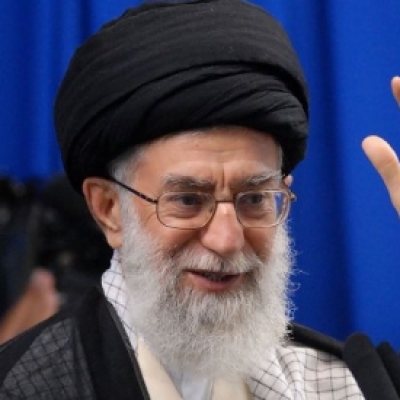Monday, February 02, 2004
Imam Khamenei on Iran’s Islamic ethos and the dangers facing the Ummah
Sunday, February 01, 2004
Welcome new edition of a famous analysis of the decline of Islamic civilization
 Abdar Rahman Koya
Abdar Rahman Koya
Our Decline: Its Causes and Remedies by Amir Shakib Arslan (new, revised edition). Pub: Islamic Book Trust, Kuala Lumpur, Malaysia, 2004 (www.ibtbooks.com). Pp: 175. US$8.00.
Sometimes people find themselves in such a mess that the only consolation seems to be to relive the past. In fact so impotent are Muslims now that even their glorious past is relived through orientalist works. Thus we find hundreds of books on Muslim achievements of the so-called academic and objective bent, written by Muslims and non-Muslims, as if even the Muslim mind were colonised. Hundreds of books also flood libraries on Islamic laws and principles, ideals and beauty, without considering whether these principles can be put into practice at a time when Muslims are in the worst situation — humiliated and subjugated despite the enormous amounts of wealth flooding their cities.
Such has been our state for over a century, especially since the collapse of the Uthmaniyyah empire and the establishment of Muslim nation-states ruled by traitors and bandits (‘royals’ and ‘sheikhs’). By 1914 almost the whole Muslim world was directly under Western rule. Muslim leadership was either completely demoralised or had concluded that it was better to join the enemies because we could not fight them all.
It was in this frustrating state that one Muhammad Bisyooni Umran, an alim in Borneo Island (present-day Indonesia), wrote to Al-Manar, the reform magazine edited by Egyptian thinker Muhammad Rashid Rida, asking the "Prince of Eloquence" to explain the causes of the Muslims’ downfall. The "Prince of Eloquence" was no other than a Lebanese-Druze Muslim, Shakib Arslan (1871-1946), known and addressed as "Amir". He was considered well placed to comment on Muslims’ affairs because of his experience in labouring for many Muslim causes. After the first ‘world war’, he moved his efforts from reviving the last caliphate (or "Ottomanism") to Arab nationalism and "Islamism", in much the same way as Jamal ad-Din al-Afghani, being consistently against the West and its policies, unlike many of his contemporaries, who were critical of Muslim "apathy" while preferring western customs in their personal lives. By his stand Arslan earned the admiration of Muslims. Later he supported the jihad of Umar al-Mukhtar in Libya against the Italian Nazis, and that of Muhammad Abd al-Karim in the Maghreb. Arslan injected new life into the narrow brand of nationalism of that time — an ‘Islamist’ nationalism, as it were. Arslan was also one of the main early architects of the revolutionary movement in Palestine in the effort to break free from colonial clutches, using his contacts with activists in Syria, Iraq, Lebanon, Egypt and Palestine and with others in the Arabian Peninsula and Muslim countries.
Thus Arslan’s reply to Bisyooni Umran, first entitled in Arabic Li maza ta’akhkhara al-Muslimun wa li maza taqaddama ghayruhum ("why Muslims are backward and others have progressed") still deserves serious consideration. That most of what he laments about Muslim backwardness is still applicable, 70 years after he wrote it, shows how little (or not at all) Muslims have inched back from their hole.
This new revised translation, renamed Our Decline: Its Causes and Remedies from Our Decline and its Causes, could not be more timely: our history of direct colonization is set to repeat itself, particularly in the Middle East. Iraq, Palestine, the Arabian peninsula, other client-states of the US, as well as Pakistan and Turkey, are today all effectively under Washington’s command. The situation is little different in essence from when European powers were implementing every sort of colonial agenda in Muslim lands.
Arslan delayed giving his diagnosis of the Muslims’ decline until after his visit to Spain, where he saw the remnants of the Islamic-Arabic civilization in Andalus, and until he had seen French attempts to Christianize the Berbers in Morocco. He begins by discussing the Muslims’ "deplorable" conditions everywhere, and why this did not encourage them to leave their miserly and selfish ways and make sacrifices: what Arslan describes as the "modern" sense of jihad. The Europeans, by contrast, for good or bad, made huge sacrifices: Germany, France, Britain, Italy and Japan sent millions of soldiers to die in battle, and spent billions on arms and munitions.
Arslan asks, "Can anyone point out a single Muslim nation of the modern time, which has sacrificed men and money as unstintingly and unhesitatingly for their country as these Christian nations of Europe have done for theirs?" One is tempted to point out that the bulk of the moneys spent by the Europeans were from lands – most of them Muslim – that they colonised, stealing their natural resources and using them for their own ends. Thus to say that these Western powers were willing to sacrifice ‘their’ wealth is a misrepresentation, or misunderstanding, of the facts. But again Shakib could ask us: Would Muslims, if they were to hold this wealth themselves, be spending and sacrificing as the Europeans did? It is true, argues Shakib, that Muslims do not possess such resources to spend, but they need only spend a small proportion of their wealth for the common cause. "Are the Muslims prepared to do so?" he asks. Their abandonment of the waqf and zakah systems, and how these are abused, is one example he highlights.
The Amir should have lived today to see how much more relevant his strictures have become. Muslim governments are completely mixed up, and today we see them busy building sky-scrapers and huge mosques, instead of improving their societies in order to avoid having to depend on the West both for the products we learnt from them to want and for those things that once we produced ourselves. This is not the case with, say, the Japanese, writes Arslan. In addition, to maintain the lifestyles of Muslim rulers also requires astronomical resources. It is a fact that Muslim economies, awash with oil wealth, have to spend more to maintain their ‘royalties’ than any other country.
To strengthen his claim of Muslim miserliness and lack of spirit of sacrifice, Arslan gives the example of how 400 million Muslims could not match the contributions of around twenty million Jews for Palestine. He gives a rough breakdown of how much Muslims contributed to the Palestine Fund at that time, and shows his frustration that one-tenth of the world’s Muslim population were found to have contributed not even a qarsh per head.
There is another aspect to the problem of Muslim decline: our preoccupation with peripheral issues. Arslan criticises severely both the so-called ultra-modern and -conservative Muslims. These are two types of people who, according to him, have damaged Islam more than any other with their narrow interpretations of the deen, one lot to please their western masters, and the other to protect their own status and position in society by their lack of regard for knowledge, and for its right to be disseminated and understood widely, instead of becoming the scholars’ exclusive preserve. While one type accept European values totally, the other interpret Islam narrowly and oppose any effort to change their plight. For Arslan both "modernists" and "conservatives" act from ignorance and dogmatism, preparing the way for the enemies of Islamic civilization to attack it, "to pick holes in it with specious arguments that the teachings of Islam are responsible for the decline and fall of the Muslims." One can safely say that Arslan is definitely referring to the likes of the Turkish military, ever eager to join the West by banning Islam altogether, as well as the followers of the Taliban, who provided ammunition our enemies were longing for. However, he considers the latter more dangerous — theirs is what he calls "incorrigible conservatism": the "rigid, inflexible following of old hackneyed conventions".
The treachery of Muslims against their own people and the existence of false scholars who issue fatwas to justify the enemies’ subversion of Islam are another cause of Muslim decline. With few exceptions, Muslim rulers think their people have been created for their service, and have no scruples about terrorizing them into submission. To justify these rulers, there sprung up "species of scholars" who are only too eager to issue fatwas on the permissibility of killing whoever is bold enough to point out the rulers’ injustices.
He also points out other treacheries committed by Muslim ‘leaders’. One cannot help but wonder at his praise for king Abdul Aziz ibn Saud, who was a member of the very elites that emerged out of treachery. Arslan may have had the astigmatism suffered by many well-meaning Muslim intellectuals and activists in this decade, who are unable to see through the people they deal with, despite their vast knowledge. Having said that, one should not let Arslan’s side-opinions and sentiments mar his arguments; we must look beyond these side-issues to gauge his opinions about the Ummah’s upliftment.
He points out that the Ummah suffered from many traitors: the Berber Muslims who allied themselves with France; some Muslims in India; and many Tartars in Russia. Their analogues are rife in this age: in Chechnya, where some "religious Chechen Muslims" are even more eager than the Russians for Chechnya to be part of the Russian Federation; in Kashmir, where some scholars have no qualms about speaking openly against the Muslims’ struggle for self-determination. These Muslims are either sucked into the colonial masters’ argument that Islam is the cause of their backwardness, and that their (the colonial masters’) only intention is to help these Muslims. Arslan may as well say that Muslims are better fighters when they fight among themselves!
These attempts at subverting Islam convinced some Muslims that the deen is the cause of their decline, and that the path of secularism is the only way out. The truth is, observes Arslan, that the ‘secular’ West are more religious, and the evidence abounds: the laws adopted by the ‘secular’ French in respect of the Berbers, to facilitate the propagation of Catholicism among them; the law imposed by the Dutch in Java to protect Christian missionaries; the Belgian government’s resolution to baptise the inhabitants of the Congo; and the British ban on preaching Islam in Uganda, Tanganyika and southern Sudan.
Throughout this book Shakib’s diagnosis is provided in the spirit of the Qur’anic proposition that "man can have nothing but what he strives for" (Q. 53:39). He not only supports his claims with ayaat, but provides evidence from his dealings with Muslim rulers and activists to drive home some points. He concludes that "sacrifice" is the necessary, irreplaceable method by which a people can redeem their dignity. It is the most obvious remedy, above everything else; only from the spirit of sacrifice in wealth, energy and lives can Muslims complain of their plight to God. It is no surprise, then, to see that the West dominates in almost every field of life today, because of the enormous efforts they have made to protect and nurture their civilization.


